
Fury is a 1936 American crime film directed by Fritz Lang that tells the story of an innocent man who narrowly escapes being burned to death by a lynch mob and the revenge he then seeks. The film was released by Metro-Goldwyn-Mayer and stars Sylvia Sidney and Tracy, with a supporting cast featuring Walter Abel, Bruce Cabot, Edward Ellis and Walter Brennan. Loosely based on the events surrounding the Brooke Hart murder in San Jose, California, the film was adapted by Bartlett Cormack and Lang from the story Mob Rule by Norman Krasna. Fury was Lang's first American film.
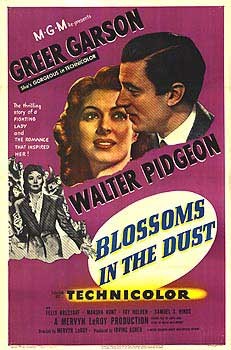
Blossoms in the Dust is a 1941 American biographical drama film directed by Mervyn LeRoy and starring Greer Garson, Walter Pidgeon, Felix Bressart, Marsha Hunt, Fay Holden and Samuel S. Hinds. It tells the story of Edna Gladney, who helped orphaned children find homes and began a campaign to remove the word "illegitimate" from Texas birth certificates, despite the opposition of "good" citizens. The screenplay was by Anita Loos, with a story by Ralph Wheelwright. Some of the important aspects of her life fictionalized in the film are the fact that it was Edna herself who was born out of wedlock; she and Sam eloped on the eve of her marriage to someone else, and they had much more time together before his death than given them in the film.
The following is an overview of 1930 in film, including significant events, a list of films released and notable births and deaths.

I Dream Too Much is a 1935 American romantic comedy film directed by John Cromwell. It stars Henry Fonda and Lily Pons, as well as Lucille Ball in an early supporting role. It has been described as a "somewhat wispy operetta." Songs are by Jerome Kern and Dorothy Fields. The film was nominated for an Academy Award in the category Sound Recording.

Follow the Fleet is a 1936 American RKO musical comedy film with a nautical theme starring Fred Astaire and Ginger Rogers in their fifth collaboration as dance partners. It also features Randolph Scott, Harriet Hilliard, and Astrid Allwyn, with music and lyrics by Irving Berlin. Lucille Ball and Betty Grable also appear, in supporting roles. The film was directed by Mark Sandrich with script by Allan Scott and Dwight Taylor based on the 1922 play Shore Leave by Hubert Osborne.
The comedy of remarriage is a subgenre of American comedy films of the 1930s and 1940s. At the time, the Production Code, also known as the Hays Code, banned any explicit references to or attempts to justify adultery and illicit sex. The comedy of remarriage with the same spouse enabled filmmakers to evade this provision of the Code. The protagonists divorced, flirted, or even had relationships, with strangers without risking the wrath of censorship, and then got back together.

Go West, Young Man is a 1936 American comedy film directed by Henry Hathaway and starring Mae West, Warren William and Randolph Scott. Released by Paramount Pictures and based on the 1934 play Personal Appearance by Lawrence Riley, the film is about a movie star who is stranded in the country and trifles with a young man's affections. The phrase "Go West, young man" is often attributed to New York Tribune founder Horace Greeley, and sometimes misattributed to Indiana journalist John B. L. Soule, but the latest research shows it to be a paraphrase.

The Milky Way is a 1936 American comedy film starring Harold Lloyd. Directed by comedy veteran Leo McCarey, the film was written by Grover Jones, Frank Butler and Richard Connell based on a play of the same name by Lynn Root and Harry Clork that was presented on Broadway in 1934.

The Moon's Our Home is a 1936 American comedy film directed by William A. Seiter and starring Henry Fonda, Margaret Sullavan and Walter Brennan. It was adapted from a novel of the same name written by Faith Baldwin and first published in serial form in Cosmopolitan magazine.
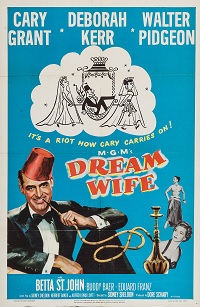
Dream Wife is a 1953 romantic comedy film starring Cary Grant and Deborah Kerr made by Metro-Goldwyn-Mayer.
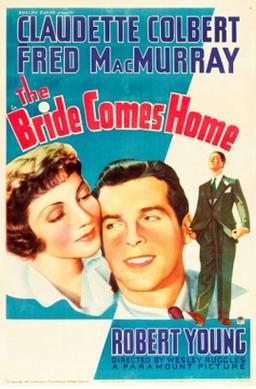
The Bride Comes Home is a 1935 comedy film made by Paramount Pictures, directed by Wesley Ruggles, and starring Claudette Colbert, Fred MacMurray and Robert Young. It was written by Claude Binyon and Elisabeth Sanxay Holding.
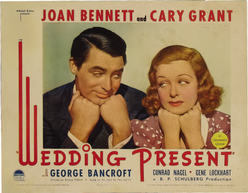
Wedding Present is a 1936 American romantic screwball comedy film directed by Richard Wallace and starring Joan Bennett, Cary Grant and George Bancroft. The screenplay was written by Joseph Anthony, based on a story by Paul Gallico. The film was distributed by Paramount Pictures. Producer B. P. Schulberg was the firm's former studio head. The film reteamed Bennett and Grant, despite the fact their previous pairing Big Brown Eyes had not been a commercial or critical success.

If You Could Only Cook (1935) is a screwball comedy of mistaken identity starring Herbert Marshall as a frustrated automobile executive and Jean Arthur as a young woman who talks him into posing as her husband so they can land jobs as a butler and a cook.
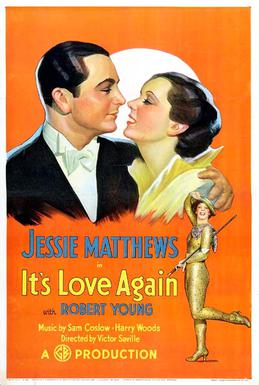
It's Love Again is a 1936 British musical film directed by Victor Saville and starring Jessie Matthews, Robert Young and Sonnie Hale. In the film, a chorus girl masquerades as a big game hunter to try to boost her showbiz career.

Alan Edwin Baxter was an American film and television actor.

Lovin' the Ladies is a 1930 American romantic comedy film directed by Melville W. Brown, and starring Richard Dix, Lois Wilson and Allen Kearns. It made a profit of $65,000.
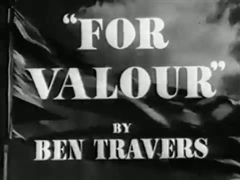
For Valour is a 1937 British comedy film directed by Tom Walls and starring Walls, Ralph Lynn and Veronica Rose. It was made at Shepperton Studios, with sets designed by Oscar Werndorff. Unlike previous films starring Walls and Lynn, it was based on an original screenplay rather than one of the Aldwych Farces. Both Walls and Lynn played dual roles of two Boer War veterans and their son and grandson respectively. It was the last time the two actors, who had been one of the most popular film comedy teams of the decade, appeared together on screen.

John Hugh Elliott was an American actor who appeared on Broadway and in over 300 films during his career. He worked sporadically during the silent film era, but with the advent of sound his career took off, where he worked constantly for 25 years, finding a particular niche in "B" westerns.

Painted Faces is a 1929 American Pre-Code mystery film directed by Albert S. Rogell and starring Joe E. Brown, Helen Foster and Barton Hepburn. The film's sets were designed by the art director Hervey Libbert.

















